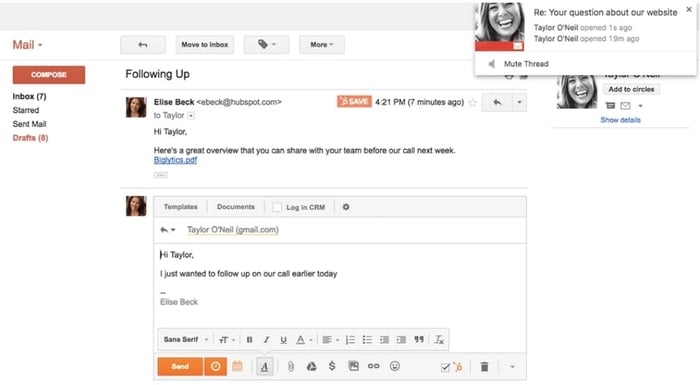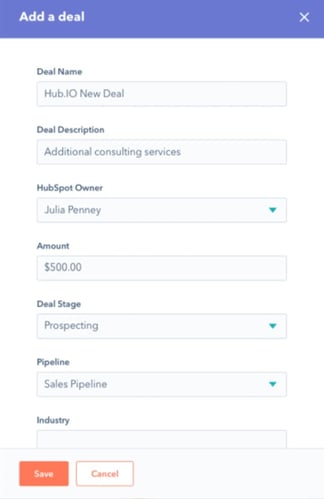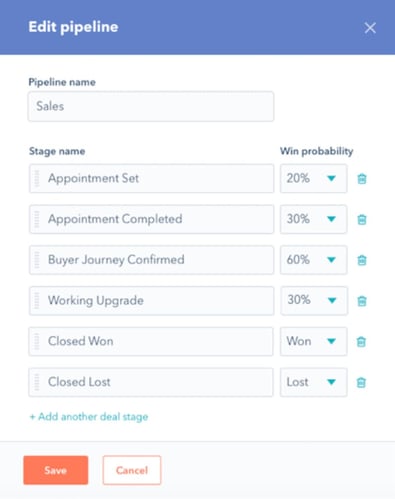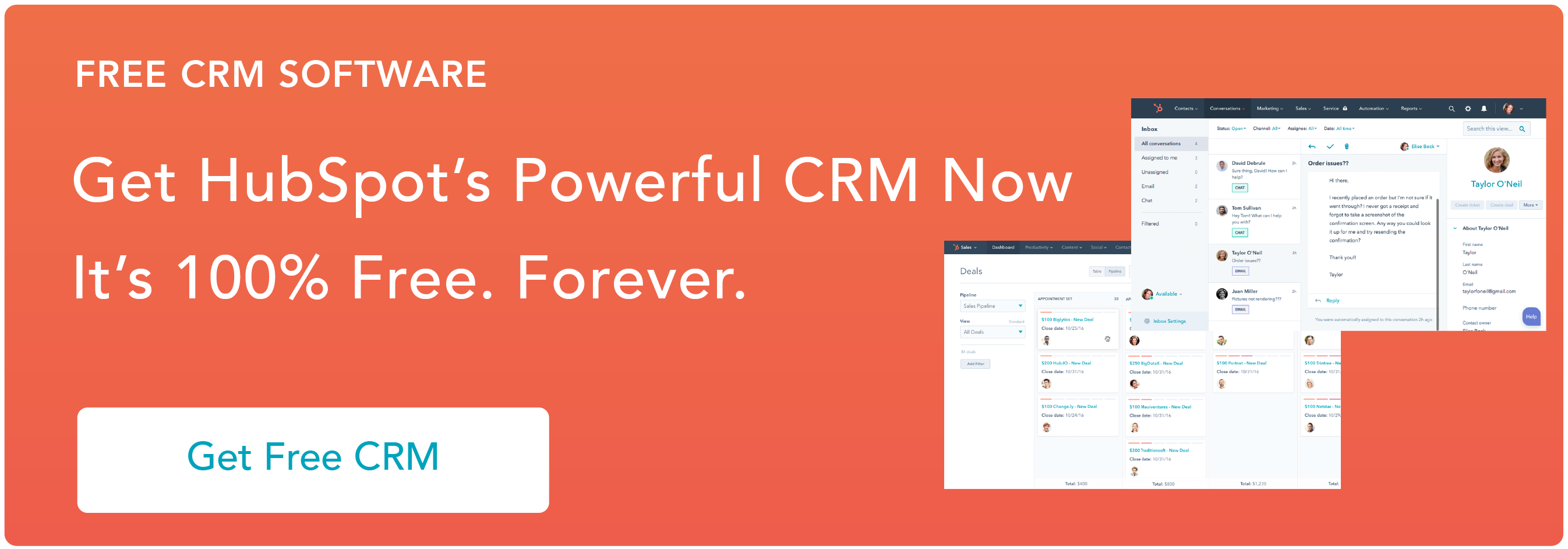A CRM like HubSpot — which comes with natively built sales tools and features — is meant to help your team track and close more deals.

A CRM can streamline prospect and customer outreach, data entry, data and sales process visualization, and performance and deal tracking (among other tasks).
CRM Deals
In this blog post, we'll provide insight into the deal-specific features of a CRM so you can better understand how one of these systems can help you better track and close more deals. But first, let's cover a quick definition of what sales deals are.
What are deals?
Deals are representative of the actions that a sales rep and a lead work through that result in a transaction — in other words, a deal is what ends with a lead becoming a customer, or a current customer deciding to upgrade. Deals generate revenue which is why they're the main goal of the sales team.
What are the parts of a deal?
Deal pipelines are used to predict revenue and identify any potential challenges that exist in your sales process.
Deal stages are your sales pipeline steps that a rep moves a prospect through in order to close a deal.
In HubSpot, you can create deal pipelines and deal stages to streamline your sales process across the entire org (and make those stages consistent across the board), ensure reps are effectively moving prospects through those stages, and (hopefully) expedite the sales process.
Here are HubSpot's defaulted deal stages in the sales pipeline in the Sales Hub:
- Appointment scheduled
- Qualified to buy
- Presentation scheduled
- Decision maker bought-in
- Contract sent
- Closed won
- Closed lost
Now, let's dive into those steps for how you can track and close more deals in a CRM.
How to Track and Close More Deals in a CRM
- Use contact management and outreach resources to reach qualified prospects.
- Automate data entry to expedite deal creation.
- Customize your pipeline to match your sales process.
- Gain comprehensive visibility into performance.
1. Use contact management and outreach resources to reach qualified prospects.
The most powerful CRMs include contact management tools. They can organize and regiment contact information you accrue through your sales and marketing efforts — whether that be through form submission, in-person interactions, or any other means of connection — in a single contact database.
That kind of accumulation and sorting of information makes for straightforward analysis to inform more effective sales processes and, in turn, help you generate more deals. It also allows your team to have access to a single source of truth when it comes to contact data.
In addition to contact management, there are other outreach resources that come with a CRM like HubSpot including email tracking. This allows you to see exactly when a lead opens an email, clicks a link, or downloads an attachment from your business. With this real-time information, you can prioritize and target leads when they're already engaged and therefore, more likely to convert.

Other outreach resources you may get if you use a CRM like HubSpot are:
- Free meeting and scheduling tools
- Free live chat and chatbot builder software
- Free prospecting tools
- A library of integrations, which include tools like Vidyard, to personalize the buyer's journey
2. Automate data entry to expedite deal creation.
Manually managing the data necessary to track and pursue deals is grating and time-consuming — ultimately, it can hinder your ability to close more deals, even though it's important work.
CRMs like HubSpot will expedite that process for you through the power of sales automation. For instance, your CRM may automatically populate and maintain deal records from contacts or company records with the most up-to-date information available, after every interaction you have with a prospect.

3. Customize your pipeline to match your sales process.
A CRM gives you the visibility and structure needed to translate an abstract sales process into an actionable sales pipeline. Creating and maintaining synchronicity between the two can streamline your ability to consistently make deals.
If your reps understand your sales process, they'll be in the best position possible to leverage it and therefore, close more deals. This is made easy with your CRM's sales pipeline tool. Here's what a sales pipeline in HubSpot looks like for reference:

It's difficult to carry out your sales process without some sort of guidance and tracking. Without that clarity, it's easy for reps to lose sight of where they are in the progression. That means not having a picture of a potential deal's ultimate feasibility or knowing how to interact with a specific prospect at a particular time.
CRMs allow you to see and easily keep tabs on how deals are progressing. That kind of insight, straightforward organization, and alignment between pipeline and process make carrying out deals considerably easier than it would be otherwise.
4. Gain comprehensive visibility into performance.
Tracking and closing deals in a CRM often rests, in part, on understanding both your reps' individual performance and overall team's success. It's important to know which team members are overachieving and under-performing. You need to be able to see what specific tactics are working for your best reps and where certain team members have room for improvement.
It's in your best interest to ensure that every member of your team is capable, familiar with your sales process, and putting in an appropriate amount of effort. Leveraging a CRM makes that process considerably easier than it would be otherwise. Many of these systems offer that kind of insight. They contain tools that allow you to check up on crucial trends and KPIs like quota attainment.
And the utility of those tools extends beyond keeping tabs on your reps. When considered holistically, those resources can help you diagnose the health of your sales pipeline.
You can pinpoint where your team is collectively losing out on deals, giving you the information necessary to address the particularly ineffective points of your sales process.
.webp?width=700&height=444&name=crmdeals_3%20(1).webp)
Your team's overall performance and sales pipeline health are central to your ability to consistently close deals. You stand to gain a lot by simplifying the process of tracking the trends and metrics that reflect those factors. A CRM can be a real asset when it comes to those tasks and practices.
Track and Close More Deals in a CRM
Leveraging a CRM is one of the better ways to enhance your sales efforts. Many contain the resources you'll need to add the structure and efficiency necessary to track and close deals on a consistent basis. If you're interested in further bolstering your sales efforts, investing in one of these systems is worth your time.
Editor's note: This post was originally published in July 2020 and has been updated for comprehensiveness.






![The Importance of a CRM: Why Your Company Needs a CRM to Grow Better [New Data]](https://blog.hubspot.com/hubfs/1-Feb-23-2021-12-59-16-65-AM.jpg)



